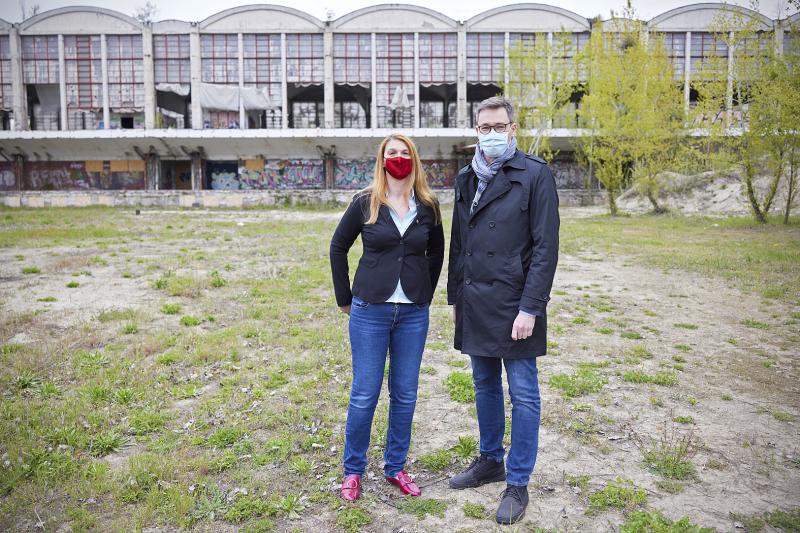Piles of garbage, discarded debris and abandoned buildings are scattered across a post-industrial area on the left bank of the Danube River, just south of the grandiose downtown of Hungary’s capital, Budapest.
The area has been unused for decades, languishing in post-socialist decay in the 30 years since anti-communist firebrands pressed for the end of Soviet domination in Hungary at the end of the 1980s.
But it’s here that one of those early reformers, Hungary’s right-wing nationalist prime minister, Viktor Orban, envisions building a gigantic university that has pledged its allegiance to the Chinese Communist Party (CCP).

Photo: AP
This week, Hungary signed a strategic agreement with the Shanghai-based Fudan University on opening a campus in Budapest by 2024. It would be the school’s only foreign outpost, and the first Chinese university campus in the 27-nation European Union.
Hungarian officials insist that Fudan, ranked among the top 100 universities in the world, will help raise higher education standards in Hungary, providing courses to 6,000 Hungarian, Chinese and other students and bringing Chinese investment and research into the country.
But critics say the massive investment places an undue financial burden on Hungarian taxpayers and shows Orban’s warming ties with autocracies in Moscow and Beijing.
“They want to bring in a university, which is indeed a serious university on the international level, but its charter requires that it represent the worldview of the Chinese Communist Party,” said Budapest mayor Gergely Karacsony, who opposes the plan. “We see very serious national security risks in this investment.”
‘EASTERN OPENING’
Government documents obtained in April by Hungarian investigative journalism center Direkt36 show that pretax construction costs for the 26-hectare campus are estimated at US$1.8 billion, more than Hungary spent on its entire higher education system in 2019.
The state plans to finance around 20 percent of the project from its central budget, and the rest through a US$1.5 billion loan from a Chinese bank. According to the documents, construction will be carried out using mostly Chinese materials and labor.
“The Chinese are doing everything, while we’re doing only one thing: paying,” Karacsony said. “Any prestigious university in the world would open a campus here if the Hungarian taxpayers paid for everything.”
Hungary’s government, which engages in frequent battles with the EU, has pursued an economic strategy its calls “Eastern Opening,” which favors increased diplomatic cooperation and trade with countries like China, Russia, Turkey and others in Central Asia.
Karacsony said the policies had made Hungary “a kind of advanced bastion of Eastern great powers in the European Union.”
Last year, Hungary agreed to take out a US$2 billion loan from China’s Exim Bank to build a railway line between Budapest and Serbia’s capital of Belgrade, part of China’s global Belt and Road initiative.
Hungary also hosts telecommunications firm Huawei’s largest supply center outside of China, and is the only country in the EU to have approved a Chinese COVID-19 vaccine.
According to Peter Kreko, director of the Budapest-based think tank Political Capital, the Fudan development is part of China’s efforts to extend soft power and influence through education programs and investments. He echoed concerns by Budapest’s mayor that the project could open the door to espionage.
“In the last few years, Hungary has become something of a spy hub for Russian and Chinese spies because of ... the lack of willingness of intelligence forces to push back malign foreign influence,” Kreko said.
POOR TRACK RECORD
The US Embassy in Budapest has expressed reservations over the Chinese university coming to Hungary “given Beijing’s proven track record of using academic institutions to advance a malign influence agenda and stifle intellectual freedom.”
Neither the Hungarian government’s spokesperson nor the ministry responsible for the project responded to multiple requests for comment. Orban has maligned Western powers for engaging in “liberal imperialism,” and champions what he calls “illiberal democracy” in Hungary, based on right-wing populism and a firm opposition to immigration.
Recent changes to the management of Hungarian universities renewed claims that Orban seeks to expand his control over the country’s educational and cultural institutions.
In 2018, Central European University, one of Hungary’s premier postgraduate institutions, was effectively forced out of the country after amendments were passed to a higher education law that were widely seen as targeting the university.
After sending the private university “into exile,” Karacsony said, “now they bring in another one which represents the ideology of the Chinese Communist Party and costs the Hungarian taxpayers billions.”
In 2019, a rare student protest erupted at Fudan’s Shanghai campus after China’s Ministry of Education changed the university’s charter, removing references to “academic independence and freedom of thought.” The charter states that the school “adheres to the leadership of the Chinese Communist Party (and) fully implements the party’s educational policy.”
During a recent visit to Tsinghua University in Beijing, Chinese President Xi Jinping (習近平) said the country’s universities should train a new generation “loyal to the socialist cause,” and to the CCP.
The site on the Danube slated for the Fudan campus was earlier chosen to host a “Student City” that would provide accommodation, recreation and sports facilities for 8,000 Hungarian students.
Krisztina Baranyi, the mayor of the Budapest district where the project is planned, said the interests of the capital city and its students were being supplanted by the Fudan project. She said she will launch a local referendum to block the construction.
“There’s no dialogue, they don’t include us in anything,” she said. “I think the referendum is the only way to show that we don’t agree with this.”

In late October of 1873 the government of Japan decided against sending a military expedition to Korea to force that nation to open trade relations. Across the government supporters of the expedition resigned immediately. The spectacle of revolt by disaffected samurai began to loom over Japanese politics. In January of 1874 disaffected samurai attacked a senior minister in Tokyo. A month later, a group of pro-Korea expedition and anti-foreign elements from Saga prefecture in Kyushu revolted, driven in part by high food prices stemming from poor harvests. Their leader, according to Edward Drea’s classic Japan’s Imperial Army, was a samurai

The following three paragraphs are just some of what the local Chinese-language press is reporting on breathlessly and following every twist and turn with the eagerness of a soap opera fan. For many English-language readers, it probably comes across as incomprehensibly opaque, so bear with me briefly dear reader: To the surprise of many, former pop singer and Democratic Progressive Party (DPP) ex-lawmaker Yu Tien (余天) of the Taiwan Normal Country Promotion Association (TNCPA) at the last minute dropped out of the running for committee chair of the DPP’s New Taipei City chapter, paving the way for DPP legislator Su

It’s hard to know where to begin with Mark Tovell’s Taiwan: Roads Above the Clouds. Having published a travelogue myself, as well as having contributed to several guidebooks, at first glance Tovell’s book appears to inhabit a middle ground — the kind of hard-to-sell nowheresville publishers detest. Leaf through the pages and you’ll find them suffuse with the purple prose best associated with travel literature: “When the sun is low on a warm, clear morning, and with the heat already rising, we stand at the riverside bike path leading south from Sanxia’s old cobble streets.” Hardly the stuff of your

Located down a sideroad in old Wanhua District (萬華區), Waley Art (水谷藝術) has an established reputation for curating some of the more provocative indie art exhibitions in Taipei. And this month is no exception. Beyond the innocuous facade of a shophouse, the full three stories of the gallery space (including the basement) have been taken over by photographs, installation videos and abstract images courtesy of two creatives who hail from the opposite ends of the earth, Taiwan’s Hsu Yi-ting (許懿婷) and Germany’s Benjamin Janzen. “In 2019, I had an art residency in Europe,” Hsu says. “I met Benjamin in the lobby